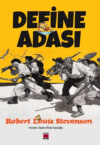Kitabı oku: «New Arabian Nights», sayfa 6
“You will have the kindness,” he said, “to maintain the strictest silence, and to conceal yourselves in the densest of the shadow.”
The three officers and the physician hastened to obey, and for nearly ten minutes the only sound in Rochester House was occasioned by the excursions of the rats behind the woodwork. At the end of that period, a loud creak of a hinge broke in with surprising distinctness on the silence; and shortly after, the watchers could distinguish a slow and cautious tread approaching up the kitchen stair. At every second step the intruder seemed to pause and lend an ear, and during these intervals, which seemed of an incalculable duration, a profound disquiet possessed the spirit of the listeners. Dr. Noel, accustomed as he was to dangerous emotions, suffered an almost pitiful physical prostration; his breath whistled in his lungs, his teeth grated one upon another, and his joints cracked aloud as he nervously shifted his position.
At last a hand was laid upon the door, and the bolt shot back with a slight report. There followed another pause, during which Brackenbury could see the Prince draw himself together noiselessly as if for some unusual exertion. Then the door opened, letting in a little more of the light of the morning; and the figure of a man appeared upon the threshold and stood motionless. He was tall, and carried a knife in his hand. Even in the twilight they could see his upper teeth bare and glistening, for his mouth was open like that of a hound about to leap. The man had evidently been over the head in water but a minute or two before; and even while he stood there the drops kept falling from his wet clothes and pattered on the floor.
The next moment he crossed the threshold. There was a leap, a stifled cry, an instantaneous struggle; and before Colonel Geraldine could spring to his aid, the Prince held the man disarmed and helpless, by the shoulders.
“Dr. Noel,” he said, “you will be so good as to re-light the lamp.”
And relinquishing the charge of his prisoner to Geraldine and Brackenbury, he crossed the room and set his back against the chimney-piece. As soon as the lamp had kindled, the party beheld an unaccustomed sternness on the Prince’s features. It was no longer Florizel, the careless gentleman; it was the Prince of Bohemia, justly incensed and full of deadly purpose, who now raised his head and addressed the captive President of the Suicide Club.
“President,” he said, “you have laid your last snare, and your own feet are taken in it. The day is beginning; it is your last morning. You have just swum the Regent’s Canal; it is your last bathe in this world. Your old accomplice, Dr. Noel, so far from betraying me, has delivered you into my hands for judgment. And the grave you had dug for me this afternoon shall serve, in God’s almighty providence, to hide your own just doom from the curiosity of mankind. Kneel and pray, sir, if you have a mind that way; for your time is short, and God is weary of your iniquities.”
The President made no answer either by word or sign; but continued to hang his head and gaze sullenly on the floor, as though he were conscious of the Prince’s prolonged and unsparing regard.
“Gentlemen,” continued Florizel, resuming the ordinary tone of his conversation, “this is a fellow who has long eluded me, but whom, thanks to Dr. Noel, I now have tightly by the heels. To tell the story of his misdeeds would occupy more time than we can now afford; but if the canal had contained nothing but the blood of his victims, I believe the wretch would have been no drier than you see him. Even in an affair of this sort I desire to preserve the forms of honour. But I make you the judges, gentlemen – this is more an execution than a duel and to give the rogue his choice of weapons would be to push too far a point of etiquette. I cannot afford to lose my life in such a business,” he continued, unlocking the case of swords; “and as a pistol-bullet travels so often on the wings of chance, and skill and courage may fall by the most trembling marksman, I have decided, and I feel sure you will approve my determination, to put this question to the touch of swords.”
When Brackenbury and Major O’Rooke, to whom these remarks were particularly addressed, had each intimated his approval, “Quick, sir,” added Prince Florizel to the President, “choose a blade and do not keep me waiting; I have an impatience to be done with you for ever.”
For the first time since he was captured and disarmed the President raised his head, and it was plain that he began instantly to pluck up courage.
“Is it to be stand up?” he asked eagerly, “and between you and me?”
“I mean so far to honour you,” replied the Prince.
“Oh, come!” cried the President. “With a fair field, who knows how things may happen? I must add that I consider it handsome behaviour on your Highness’s part; and if the worst comes to the worst I shall die by one of the most gallant gentlemen in Europe.”
And the President, liberated by those who had detained him, stepped up to the table and began, with minute attention, to select a sword. He was highly elated, and seemed to feel no doubt that he should issue victorious from the contest. The spectators grew alarmed in the face of so entire a confidence, and adjured Prince Florizel to reconsider his intention.
“It is but a farce,” he answered; “and I think I can promise you, gentlemen, that it will not be long a-playing.”
“Your Highness will be careful not to over-reach,” said Colonel Geraldine.
“Geraldine,” returned the Prince, “did you ever know me fail in a debt of honour? I owe you this man’s death, and you shall have it.”
The President at last satisfied himself with one of the rapiers, and signified his readiness by a gesture that was not devoid of a rude nobility. The nearness of peril, and the sense of courage, even to this obnoxious villain, lent an air of manhood and a certain grace.
The Prince helped himself at random to a sword.
“Colonel Geraldine and Doctor Noel,” he said, “will have the goodness to await me in this room. I wish no personal friend of mine to be involved in this transaction. Major O’Rooke, you are a man of some years and a settled reputation – let me recommend the President to your good graces. Lieutenant Rich will be so good as lend me his attentions: a young man cannot have too much experience in such affairs.”
“Your Highness,” replied Brackenbury, “it is an honour I shall prize extremely.”
“It is well,” returned Prince Florizel; “I shall hope to stand your friend in more important circumstances.”
And so saying he led the way out of the apartment and down the kitchen stairs.
The two men who were thus left alone threw open the window and leaned out, straining every sense to catch an indication of the tragical events that were about to follow. The rain was now over; day had almost come, and the birds were piping in the shrubbery and on the forest trees of the garden. The Prince and his companions were visible for a moment as they followed an alley between two flowering thickets; but at the first corner a clump of foliage intervened, and they were again concealed from view. This was all that the Colonel and the Physician had an opportunity to see, and the garden was so vast, and the place of combat evidently so remote from the house, that not even the noise of sword-play reached their ears.
“He has taken him towards the grave,” said Dr. Noel, with a shudder.
“God,” cried the Colonel, “God defend the right!”
And they awaited the event in silence, the Doctor shaking with fear, the Colonel in an agony of sweat. Many minutes must have elapsed, the day was sensibly broader, and the birds were singing more heartily in the garden before a sound of returning footsteps recalled their glances towards the door. It was the Prince and the two Indian officers who entered. God had defended the right.
“I am ashamed of my emotion,” said Prince Florizel; “I feel it is a weakness unworthy of my station, but the continued existence of that hound of hell had begun to prey upon me like a disease, and his death has more refreshed me than a night of slumber. Look, Geraldine,” he continued, throwing his sword upon the floor, “there is the blood of the man who killed your brother. It should be a welcome sight. And yet,” he added, “see how strangely we men are made! my revenge is not yet five minutes old, and already I am beginning to ask myself if even revenge be attainable on this precarious stage of life. The ill he did, who can undo it? The career in which he amassed a huge fortune (for the house itself in which we stand belonged to him) – that career is now a part of the destiny of mankind for ever; and I might weary myself making thrusts in carte until the crack of judgment, and Geraldine’s brother would be none the less dead, and a thousand other innocent persons would be none the less dishonoured and debauched! The existence of a man is so small a thing to take, so mighty a thing to employ! Alas!” he cried, “is there anything in life so disenchanting as attainment?”
“God’s justice has been done,” replied the Doctor. “So much I behold. The lesson, your Highness, has been a cruel one for me; and I await my own turn with deadly apprehension.”
“What was I saying?” cried the Prince. “I have punished, and here is the man beside us who can help me to undo. Ah, Dr. Noel! you and I have before us many a day of hard and honourable toil; and perhaps, before we have none, you may have more than redeemed your early errors.”
“And in the meantime,” said the Doctor, “let me go and bury my oldest friend.”
(And this, observes the erudite Arabian, is the fortunate conclusion of the tale. The Prince, it is superfluous to mention, forgot none of those who served him in this great exploit; and to this day his authority and influence help them forward in their public career, while his condescending friendship adds a charm to their private life. To collect, continues my author, all the strange events in which this Prince has played the part of Providence were to fill the habitable globe with books. But the stories which relate to the fortunes of The Rajah’s Diamond are of too entertaining a description, says he, to be omitted. Following prudently in the footsteps of this Oriental, we shall now begin the series to which he refers with the Story of the Bandbox.)
THE RAJAH’S DIAMOND
STORY OF THE BANDBOX
Up to the age of sixteen, at a private school and afterwards at one of those great institutions for which England is justly famous, Mr. Harry Hartley had received the ordinary education of a gentleman. At that period, he manifested a remarkable distaste for study; and his only surviving parent being both weak and ignorant, he was permitted thenceforward to spend his time in the attainment of petty and purely elegant accomplishments. Two years later, he was left an orphan and almost a beggar. For all active and industrious pursuits, Harry was unfitted alike by nature and training. He could sing romantic ditties, and accompany himself with discretion on the piano; he was a graceful although a timid cavalier; he had a pronounced taste for chess; and nature had sent him into the world with one of the most engaging exteriors that can well be fancied. Blond and pink, with dove’s eyes and a gentle smile, he had an air of agreeable tenderness and melancholy, and the most submissive and caressing manners. But when all is said, he was not the man to lead armaments of war, or direct the councils of a State.
A fortunate chance and some influence obtained for Harry, at the time of his bereavement, the position of private secretary to Major-General Sir Thomas Vandeleur, C.B. Sir Thomas was a man of sixty, loud-spoken, boisterous, and domineering. For some reason, some service the nature of which had been often whispered and repeatedly denied, the Rajah of Kashgar had presented this officer with the sixth known diamond of the world. The gift transformed General Vandeleur from a poor into a wealthy man, from an obscure and unpopular soldier into one of the lions of London society; the possessor of the Rajah’s Diamond was welcome in the most exclusive circles; and he had found a lady, young, beautiful, and well-born, who was willing to call the diamond hers even at the price of marriage with Sir Thomas Vandeleur. It was commonly said at the time that, as like draws to like, one jewel had attracted another; certainly Lady Vandeleur was not only a gem of the finest water in her own person, but she showed herself to the world in a very costly setting; and she was considered by many respectable authorities, as one among the three or four best dressed women in England.
Harry’s duty as secretary was not particularly onerous; but he had a dislike for all prolonged work; it gave him pain to ink his lingers; and the charms of Lady Vandeleur and her toilettes drew him often from the library to the boudoir. He had the prettiest ways among women, could talk fashions with enjoyment, and was never more happy than when criticising a shade of ribbon, or running on an errand to the milliner’s. In short, Sir Thomas’s correspondence fell into pitiful arrears, and my Lady had another lady’s maid.
At last the General, who was one of the least patient of military commanders, arose from his place in a violent access of passion, and indicated to his secretary that he had no further need for his services, with one of those explanatory gestures which are most rarely employed between gentlemen. The door being unfortunately open, Mr. Hartley fell downstairs head foremost.
He arose somewhat hurt and very deeply aggrieved. The life in the General’s house precisely suited him; he moved, on a more or less doubtful footing, in very genteel company, he did little, he ate of the best, and he had a lukewarm satisfaction in the presence of Lady Vandeleur, which, in his own heart, he dubbed by a more emphatic name.
Immediately after he had been outraged by the military foot, he hurried to the boudoir and recounted his sorrows.
“You know very well, my dear Harry,” replied Lady Vandeleur, for she called him by name like a child or a domestic servant, “that you never by any chance do what the General tells you. No more do I, you may say. But that is different. A woman can earn her pardon for a good year of disobedience by a single adroit submission; and, besides, no one is married to his private secretary. I shall be sorry to lose you; but since you cannot stay longer in a house where you have been insulted, I shall wish you good-bye, and I promise you to make the General smart for his behaviour.”
Harry’s countenance fell; tears came into his eyes, and he gazed on Lady Vandeleur with a tender reproach.
“My Lady,” said he, “what is an insult? I should think little indeed of any one who could not forgive them by the score. But to leave one’s friends; to tear up the bonds of affection – ”
He was unable to continue, for his emotion choked him, and he began to weep.
Lady Vandeleur looked at him with a curious expression. “This little fool,” she thought, “imagines himself to be in love with me. Why should he not become my servant instead of the General’s? He is good-natured, obliging, and understands dress; and besides it will keep him out of mischief. He is positively too pretty to be unattached.” That night she talked over the General, who was already somewhat ashamed of his vivacity; and Harry was transferred to the feminine department, where his life was little short of heavenly. He was always dressed with uncommon nicety, wore delicate flowers in his button-hole, and could entertain a visitor with tact and pleasantry. He took a pride in servility to a beautiful woman; received Lady Vandeleur’s commands as so many marks of favour; and was pleased to exhibit himself before other men, who derided and despised him, in his character of male lady’s-maid and man milliner. Nor could he think enough of his existence from a moral point of view. Wickedness seemed to him an essentially male attribute, and to pass one’s days with a delicate woman, and principally occupied about trimmings, was to inhabit an enchanted isle among the storms of life.
One fine morning he came into the drawing-room and began to arrange some music on the top of the piano. Lady Vandeleur, at the other end of the apartment, was speaking somewhat eagerly with her brother, Charlie Pendragon, an elderly young man, much broken with dissipation, and very lame of one foot. The private secretary, to whose entrance they paid no regard, could not avoid overhearing a part of their conversation.
“To-day or never,” said the lady. “Once and for all, it shall be done to-day.”
“To-day, if it must be,” replied the brother, with a sigh. “But it is a false step, a ruinous step, Clara; and we shall live to repent it dismally.”
Lady Vandeleur looked her brother steadily and somewhat strangely in the face.
“You forget,” she said; “the man must die at last.”
“Upon my word, Clara,” said Pendragon, “I believe you are the most heartless rascal in England.”
“You men,” she returned, “are so coarsely built, that you can never appreciate a shade of meaning. You are yourselves rapacious, violent, immodest, careless of distinction; and yet the least thought for the future shocks you in a woman. I have no patience with such stuff. You would despise in a common banker the imbecility that you expect to find in us.”
“You are very likely right,” replied her brother; “you were always cleverer than I. And, anyway, you know my motto: The family before all.”
“Yes, Charlie,” she returned, taking his hand in hers, “I know your motto better than you know it yourself. ‘And Clara before the family!’ Is not that the second part of it? Indeed, you are the best of brothers, and I love you dearly.”
Mr. Pendragon got up, looking a little confused by these family endearments.
“I had better not be seen,” said he. “I understand my part to a miracle, and I’ll keep an eye on the Tame Cat.”
“Do,” she replied. “He is an abject creature, and might ruin all.”
She kissed the tips of her fingers to him daintily; and the brother withdrew by the boudoir and the back stair.
“Harry,” said Lady Vandeleur, turning towards the secretary as soon as they were alone, “I have a commission for you this morning. But you shall take a cab; I cannot have my secretary freckled.”
She spoke the last words with emphasis and a look of half-motherly pride that caused great contentment to poor Harry; and he professed himself charmed to find an opportunity of serving her.
“It is another of our great secrets,” she went on archly, “and no one must know of it but my secretary and me. Sir Thomas would make the saddest disturbance; and if you only knew how weary I am of these scenes! Oh, Harry, Harry, can you explain to me what makes you men so violent and unjust? But, indeed, I know you cannot; you are the only man in the world who knows nothing of these shameful passions; you are so good, Harry, and so kind; you, at least, can be a woman’s friend; and, do you know? I think you make the others more ugly by comparison.”
“It is you,” said Harry gallantly, “who are so kind to me. You treat me like – ”
“Like a mother,” interposed Lady Vandeleur; “I try to be a mother to you. Or, at least,” she corrected herself with a smile, “almost a mother. I am afraid I am too young to be your mother really. Let us say a friend – a dear friend.”
She paused long enough to let her words take effect in Harry’s sentimental quarters, but not long enough to allow him a reply.
“But all this is beside our purpose,” she resumed. “You will find a bandbox in the left-hand side of the oak wardrobe; it is underneath the pink slip that I wore on Wednesday with my Mechlin. You will take it immediately to this address,” and she gave him a paper, “but do not, on any account, let it out of your hands until you have received a receipt written by myself. Do you understand? Answer, if you please – answer! This is extremely important, and I must ask you to pay some attention.”
Harry pacified her by repeating her instructions perfectly; and she was just going to tell him more when General Vandeleur flung into the apartment, scarlet with anger, and holding a long and elaborate milliner’s bill in his hand.
“Will you look at this, madam?” cried he. “Will you have the goodness to look at this document? I know well enough you married me for my money, and I hope I can make as great allowances as any other man in the service; but, as sure as God made me, I mean to put a period to this disreputable prodigality.”
“Mr. Hartley,” said Lady Vandeleur, “I think you understand what you have to do. May I ask you to see to it at once?”
“Stop,” said the General, addressing Harry, “one word before you go.” And then, turning again to Lady Vandeleur, “What is this precious fellow’s errand?” he demanded. “I trust him no further than I do yourself, let me tell you. If he had as much as the rudiments of honesty, he would scorn to stay in this house; and what he does for his wages is a mystery to all the world. What is his errand, madam? and why are you hurrying him away?”
“I supposed you had something to say to me in private,” replied the lady.
“You spoke about an errand,” insisted the General. “Do not attempt to deceive me in my present state of temper. You certainly spoke about an errand.”
“If you insist on making your servants privy to our humiliating dissensions,” replied Lady Vandeleur, “perhaps I had better ask Mr. Hartley to sit down. No?” she continued; “then you may go, Mr. Hartley. I trust you may remember all that you have heard in this room; it may be useful to you.”
Harry at once made his escape from the drawing-room; and as he ran upstairs he could hear the General’s voice upraised in declamation, and the thin tones of Lady Vandeleur planting icy repartees at every opening. How cordially he admired the wife! How skilfully she could evade an awkward question! with what secure effrontery she repeated her instructions under the very guns of the enemy! and on the other hand, how he detested the husband!
There had been nothing unfamiliar in the morning’s events, for he was continually in the habit of serving Lady Vandeleur on secret missions, principally connected with millinery. There was a skeleton in the house, as he well knew. The bottomless extravagance and the unknown liabilities of the wife had long since swallowed her own fortune, and threatened day by day to engulph that of the husband. Once or twice in every year exposure and ruin seemed imminent, and Harry kept trotting round to all sorts of furnishers’ shops, telling small fibs, and paying small advances on the gross amount, until another term was tided over, and the lady and her faithful secretary breathed again. For Harry, in a double capacity, was heart and soul upon that side of the war: not only did he adore Lady Vandeleur and fear and dislike her husband, but he naturally sympathised with the love of finery, and his own single extravagance was at the tailor’s.
He found the bandbox where it had been described, arranged his toilette with care, and left the house. The sun shone brightly; the distance he had to travel was considerable, and he remembered with dismay that the General’s sudden irruption had prevented Lady Vandeleur from giving him money for a cab. On this sultry day there was every chance that his complexion would suffer severely; and to walk through so much of London with a bandbox on his arm was a humiliation almost insupportable to a youth of his character. He paused, and took counsel with himself. The Vandeleurs lived in Eaton Place; his destination was near Notting Hill; plainly, he might cross the Park by keeping well in the open and avoiding populous alleys; and he thanked his stars when he reflected that it was still comparatively early in the day.
Anxious to be rid of his incubus, he walked somewhat faster than his ordinary, and he was already some way through Kensington Gardens when, in a solitary spot among trees, he found himself confronted by the General.
“I beg your pardon, Sir Thomas,” observed Harry, politely falling on one side; for the other stood directly in his path.
“Where are you going, sir?” asked the General.
“I am taking a little walk among the trees,” replied the lad.
The General struck the bandbox with his cane.
“With that thing?” he cried; “you lie, sir, and you know you lie!”
“Indeed, Sir Thomas,” returned Harry, “I am not accustomed to be questioned in so high a key.”
“You do not understand your position,” said the General. “You are my servant, and a servant of whom I have conceived the most serious suspicions. How do I know but that your box is full of teaspoons?”
“It contains a silk hat belonging to a friend,” said Harry.
“Very well,” replied General Vandeleur. “Then I want to see your friend’s silk hat. I have,” he added grimly, “a singular curiosity for hats; and I believe you know me to be somewhat positive.”
“I beg your pardon, Sir Thomas, I am exceedingly grieved,” Harry apologised; “but indeed this is a private affair.”
The General caught him roughly by the shoulder with one hand, while he raised his cane in the most menacing manner with the other. Harry gave himself up for lost; but at the same moment Heaven vouchsafed him an unexpected defender in the person of Charlie Pendragon, who now strode forward from behind the trees.
“Come, come, General, hold your hand,” said he, “this is neither courteous nor manly.”
“Aha!” cried the General, wheeling round upon his new antagonist, “Mr. Pendragon! And do you suppose, Mr. Pendragon, that because I have had the misfortune to marry your sister, I shall suffer myself to be dogged and thwarted by a discredited and bankrupt libertine like you? My acquaintance with Lady Vandeleur, sir, has taken away all my appetite for the other members of her family.”
“And do you fancy, General Vandeleur,” retorted Charlie, “that because my sister has had the misfortune to marry you, she there and then forfeited her rights and privileges as a lady? I own, sir, that by that action she did as much as anybody could to derogate from her position; but to me she is still a Pendragon. I make it my business to protect her from ungentlemanly outrage, and if you were ten times her husband I would not permit her liberty to be restrained, nor her private messengers to be violently arrested.”
“How is that, Mr. Hartley?” interrogated the General. “Mr. Pendragon is of my opinion, it appears. He too suspects that Lady Vandeleur has something to do with your friend’s silk hat.”
Charlie saw that he had committed an unpardonable blunder, which he hastened to repair.
“How, sir?” he cried; “I suspect, do you say? I suspect nothing. Only where I find strength abused and a man brutalising his inferiors, I take the liberty to interfere.”
As he said these words he made a sign to Harry, which the latter was too dull or too much troubled to understand.
“In what way am I to construe your attitude, sir?” demanded Vandeleur.
“Why, sir, as you please,” returned Pendragon.
The General once more raised his cane, and made a cut for Charlie’s head; but the latter, lame foot and all, evaded the blow with his umbrella, ran in, and immediately closed with his formidable adversary.
“Run, Harry, run!” he cried; “run, you dolt!”
Harry stood petrified for a moment, watching the two men sway together in this fierce embrace; then he turned and took to his heels. When he cast a glance over his shoulder he saw the General prostrate under Charlie’s knee, but still making desperate efforts to reverse the situation; and the Gardens seemed to have filled with people, who were running from all directions towards the scene of fight. This spectacle lent the secretary wings; and he did not relax his pace until he had gained the Bayswater road, and plunged at random into an unfrequented by-street.
To see two gentlemen of his acquaintance thus brutally mauling each other was deeply shocking to Harry. He desired to forget the sight; he desired, above all, to put as great a distance as possible between himself and General Vandeleur; and in his eagerness for this he forgot everything about his destination, and hurried before him headlong and trembling. When he remembered that Lady Vandeleur was the wife of one and the sister of the other of these gladiators, his heart was touched with sympathy for a woman so distressingly misplaced in life. Even his own situation in the General’s household looked hardly so pleasing as usual in the light of these violent transactions.
He had walked some little distance, busied with these meditations, before a slight collision with another passenger reminded him of the bandbox on his arm.
“Heavens!” cried he, “where was my head? and whither have I wandered?”
Thereupon he consulted the envelope which Lady Vandeleur had given him. The address was there, but without a name. Harry was simply directed to ask for “the gentleman who expected a parcel from Lady Vandeleur,” and if he were not at home to await his return. The gentleman, added the note, should present a receipt in the handwriting of the lady herself. All this seemed mightily mysterious, and Harry was above all astonished at the omission of the name and the formality of the receipt. He had thought little of this last when he heard it dropped in conversation; but reading it in cold blood, and taking it in connection with the other strange particulars, he became convinced that he was engaged in perilous affairs. For half a moment he had a doubt of Lady Vandeleur herself; for he found these obscure proceedings somewhat unworthy of so high a lady, and became more critical when her secrets were preserved against himself. But her empire over his spirit was too complete, he dismissed his suspicions, and blamed himself roundly for having so much as entertained them.
In one thing, however, his duty and interest, his generosity and his terrors, coincided – to get rid of the bandbox with the greatest possible despatch.










